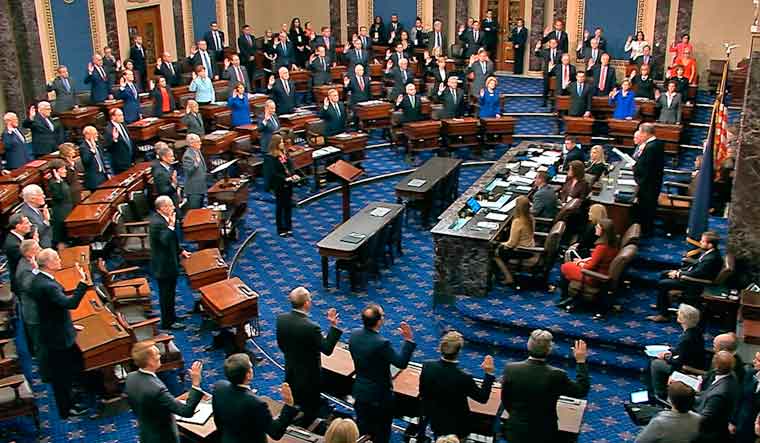Fri Dec 03, 2021
Friday / December 3
US stopgag funding bill
The U.S. House of Representatives passed the bill on Thursday, funding the government through February 18.
The House sent the bill to the Senate, which must approve it before midnight on Friday to prevent the federal government from shutting down.
Some Republicans have indicated they may delay the bill's passage amid disagreements over President Biden's vaccine mandate policy.
If Democrats don't respond to demands from Republicans led by Senators Mike Lee, Ted Cruz and Roger Marshall, the government could be forced to shut down briefly over the weekend. In this case, the delay is only temporary, and is unlikely to have a major impact on the federal agency and employees.
US Senate majority leader Schumer announced an agreement with Republicans over voting.
Fitch's Turkey rating
Fitch Ratings revised the Outlook on Turkey's Long-Term Issuer Default Ratings (IDRs) to Negative from Stable and affirmed the IDRs at 'BB-'.
"The central bank's premature monetary policy easing cycle and the prospect of further rate cuts or additional economic stimulus ahead of the 2023 presidential election have led to a deterioration in domestic confidence, reflected in a sharp depreciation of the Turkish lira, including unprecedented intra-day volatility, and rising inflation.
These developments create risks to macroeconomic and financial stability and could potentially re-ignite external financing pressures," Fitch said.
US Stocks
US stocks rebounded sharply on Thursday, after sales amid the Covid19 virus Omicron variant in previous sessions.
The Dow Jones Industrial Average climbed 617.75 points to 34,639.79, helped by a 7.5% increase in Boeing's stock. The S&P 500 was up 1.4% to 4,577.10. The tech-heavy Nasdaq Composite rose 0.8% to 15,381.32. The small-scale benchmark Russell 2000, filled with the most economically sensitive names, added 2.7% gains.
Shares of Dow component Boeing rose 7.5% after China allowed its 737 Max aircraft to take off again.
Nuclear talks pessimistic
Both the United States and Iran were pessimistic about reviving the 2015 nuclear deal in their statements on Thursday. Washington said it had little reason for optimism. Tehran has questioned the determination of the US and European negotiators.
"I have to tell you, recent moves, recent rhetoric, don't give us a lot of cause for ... optimism," U.S. Secretary of State Antony Blinken told reporters in Stockholm, saying he could judge in a day or so if Iran would engage in good faith.
"We went to Vienna with serious determination, but we are not optimistic about the will and the intention of the United States and the three European parties to the deal," Iranian foreign minister Hossein Amirabdollahian was quoted by Iranian media as saying in a conversation with his Japanese counterpart.
EU-US vs China
The US and EU issued a long, joint statement on Thursday, promising "continuous and close contacts" to "manage our competition and systemic rivalry with China responsibly."
According to senior Biden administration officials, the United States and the European Union are adopting views that are "increasingly closer" to the threat posed by the Chinese government.
European leaders were initially wary of President Biden's plans to form a coalition of US allies against China, hoping to avoid any conflict between the bloc's two biggest trading partners. But the tide in Europe is turning against China, in part because of Beijing's increased beligerent position, Axios wrote.
The statement comes after the second high-level US-EU China Dialogue meeting in Washington led by Wendy Sherman, US Assistant Secretary of State and the top diplomat for China, and EU diplomat Stefano Sannino.
Sherman met with counterpart officials from South Korea and Japan on Wednesday.
Sanctions on Belarus
The western allies, led by the US and the European Union, sanctioned dozens of Belarusian individuals and entities in a coordinated action against President Alexander Lukashenko and his government.
Lukashenko is accused of cheating last year to stay in power in the presidential elections, putting pressure on the opposition, including torture, and recently sending migrants to the EU border. Western countries accuse Putin of supporting Lukashenko.
Thursday's action was coordinated between the US, Canada, the UK and the EU. In a joint statement, the group urged the Lukashenko government to immediately and completely stop the wave of irregular migration at its borders with the EU.
